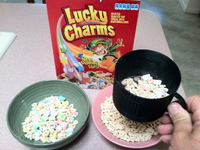 Nick Bilton of the New York Times writes on the current “Wild West” state of legal affairs in the world of 3D printing. He compares the trading of digital 3D models with today’s sharing of music and video: “You think that was bad? Just wait until we can copy physical things.” We strongly agree with this, simply because there are so many more possibilities for mayhem in the physical space.
Nick Bilton of the New York Times writes on the current “Wild West” state of legal affairs in the world of 3D printing. He compares the trading of digital 3D models with today’s sharing of music and video: “You think that was bad? Just wait until we can copy physical things.” We strongly agree with this, simply because there are so many more possibilities for mayhem in the physical space. Bilton relates the quickly-becoming-infamous story of the Lucky Charm Cereal Sifter, a design offered free on Thingiverse by maker Thomas Lombardi. It’s a cup that can sift out the best parts of the cereal (the marshmallow, of course). While offering a great design gratis is commendable, Lombardi must have been slightly upset upon learning his design had apparently been replicated and offered for sale on Shapeways’ 3D printing service.
But what is a designer to do? In this case Lombardi offered the design to all at no charge via Thingiverse and selected the Attribution – Share Alike – Creative Commons license, which basically means you can reuse the model, even for commercial use, so long as you credit Lombardi and maintain the license. But that didn’t happen. Did Shapeways user johnnylingo (Royston Stevens) commit some form of crime? In fact, the Shapeways version is not a remix; it appears to be an entirely new design that happens to do the same function. Duplicating the function is not necessarily the same as copying the work.
Where is all this going? We’re not sure, but it will be interesting and dramatic.

